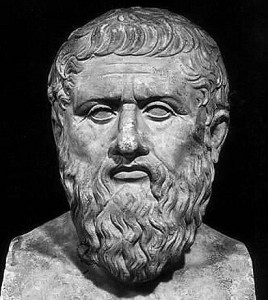“Plato accepted his teaching, but held that the problem applied not to any sensible thing but to entities of another kind—for this reason, that the common definition could not be a definition of any sensible thing, as they were always changing. Things of this other sort, then, he called Ideas, and sensible things, he said, were apart from these, and were all called after these; for the multitude of things which have the same name as the Form exist by participation in it. Only the name ‘participation’ was new; for the Pythagoreans say that things exist by imitation of numbers, and Plato says they exist by participation, changing the name. But what the participation or the imitation of the Forms could be they left an open question” (V I, Book VI).
After coming from reading several excerpts from Plato’s documents concerning Socrates’ life experiences and lessons, I find the transition to examining Plato’s ideas through Aristotle quite fascinating. It is somewhat reticent of coming full circle in that after Plato sharing his mentor’s philosophy in various different documents, now Aristotle is relating his mentor’s theories.
Additionally, I found this passage very interesting for its content. I find that I do not understand much of it except for the last two lines, especially the part concerning participation in relation to Form. Therefore, I bring this excerpt of the reading up for discussion because I am not entirely sure of its meaning and want to come to a better understanding to it.
What I gather from this passage is that Plato believed that change dictates much of life, and that its transformative power allows for progression in many aspects of existence. He was convinced that nothing was concrete or static; everything was constantly evolving into different things. Unlike Socrates, his beloved teacher, Plato was focused on both the ethical and the physical, looking at all entities of knowledge in order to gain a better understanding of the universe.
Plato did not believe in simple definitions; rather, he was convinced that the term “Idea” was the best word that could be used to define the concept of a certain form of existence. According to Plato, a “common definition could not be a definition of any sensible thing, as they [entities of another kind] were always changing” (V I, Book VI).
Furthermore, he believed that all things exist in relation to Form, or an abstract property or quality. This means that by stripping away fundamental or properties or qualities and examining just the object by itself, one would be able to analyze the form of that object. Based off of this theory, Plato believed that forms are the causes of all that exists in the world. He, therefore, asserts that the best way in which to examine the world is through the sensation of non-material abstract forms, or ideas, in order to gain the most fundamental source of reality.
I have to say that I am very confused by what this all means. I am in agreement with most of what I understand from this passage, but I am still pretty lost about the idea of participation in Form. I do believe that nearly everything in life is transitory, constantly evolving and always moving in one direction or another. I also believe that if we strip an object of its characteristics and qualities, we can move towards understanding what it is composed of, what its qualities can cause or bring forth, and why it exists. However, I am still pretty confused about Plato’s theory concerning Form.
Any thoughts?

